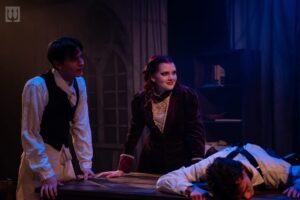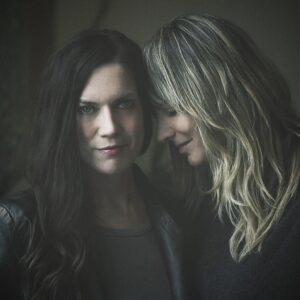the cast of sick
sarah miller-garvin
When I first moved to Toronto in September 2007 I was immediately overwhelmed and perpetually flabbergasted by how polished and professional every single theatrical event that I attended seemed. Then in 2008 I attended Judith Thompson’s Body and Soul, a play made up of fifteen “real” women (I feel like I’m doing a disservice writing that, perpetuating the myth that actors aren’t “real” people, so fifteen woman portraying themselves) between the age of 46 and 79 and I was reminded ardently of the collectives that I used to co-create while I was a student at Neptune Theatre School in Halifax, under the direction of Jennette White. I was struck, though, how powerful this play was, despite the fact that it had been stripped of most of its professional polish, and that it was because of that rawness, not in spite of it, that it was so moving, poignant and empowering. Thompson returns with The Grace Project: SICK, which plays until January 16th 2011 at the Next Stage Festival, featuring the stories of fourteen young people who have already in their short lives overcome great adversity, usually one that presented itself as an illness.
Since SICK is made up of a younger ensemble it reminded me even more acutely of my own collective creation past, as it uses many of the conventions of this genre to great effect. The individual stories become the collective “our” story, as their dialogue overlaps, and using physical theatre, song and dance, they play roles to dramatize each other’s narratives. This works especially well in this show because we hear a great number of voices speaking about feeling isolated, being different, they even refer to themselves as “the freak show” and yet here, they are united. Onstage no one is alone, not one is left behind and the camaraderie is palpable as the force that helps their strength and their courage and perpetuates their joy in being here together.
In Improv it often helps to think of simple phrases to say that can reveal potentially fascinating, intense and psychologically enlightening aspects of one’s character, and Judith Thompson has used this method in the creation of this work as well. Scattered amid the individual stories, interwoven into the action, each person makes a series of powerful statements: “I believe ___”, “I’m scared of ____”, “I regret___”, “I wish___”, “I hate you because___.” It may seem textbook but their answers are worth it.
Jordan Balzan speaks about depression and his anger as he speaks festers and then subsides and it is so obvious that he isn’t acting; you can see the pain in his eyes when he talks about his mother and his sister and how much he loves them. Domanique Grant discusses an issue that I don’t think I have ever seen tackled onstage before, the idea of a black person being victimized by those of her own race for “not being black enough” and then, conversely, white people making assumptions about her based on the colour of her skin such as a teacher who once whispered in her ear, “don’t get pregnant” and a man on a train who once tried to convince her she was from Nigeria (“I’m from Canada,” she says.) Racism and race relations are an incredibly complex issue, and the idea of blacks being “whitewashed” is one side of that which seems to be sequestered. She also uses her soulful and emotive singing voice to express her relationship to her own identity. Malube Uhindugingala, a French speaking black woman, depicts her High School days as being violent and oppressive because she was treated like an “alien” because of the colour of her skin. Both Grant and Uhindugingala are actors and their ability to communicate eloquently and captivatingly thrust the audience with immediacy into their stories.
Megan Dale Murray and Nicole Dale Murray are fourteen year old identical twins with Juvenile Diabetes. Their love and intense connection to one another is immediately apparent which sets them apart from the rest of the ensemble because they are not alone, for them this journey is a shared one, and one that they are committed to helping one another through. Their sisterly care is to be admired, if not envied, and the demonstration of their twin language is both fascinating and hilarious. Adrian Rebucas, a gay Filipino runaway, whose adolescence was filled with drug abuse, alcoholism and sexual promiscuity shows shrewd insight and fierce determination in telling his story, during which at one point he says poetically, “I could sit here or I could get up and WALK,” the choice to continue to move forward seems such a pertinent metaphor. He is also an incredible dancer, whose movement channels all his raw fortitude into something artful and captivating. He talks to Nazmul Shaheed, a gay Muslim; about the hardships Shaheed has had reconciling his sexual orientation and his faith. Dryly they mention that one of the similarities between Catholicism and Islam is that both have a God that hates them.
David Shelley is charming, crooning old fashioned standards beautifully and twirling girls effortlessly around the stage. He is a member of the Stratford Birmingham Conservatory for Classical Theatre and he has cancer. Despite the fact that he has had an operation to remove a tumour that clung to the inside of his chest, his cancer still “lies in waiting.” He speaks passionately about Margaret, the love who has pulled him through, in a real honest to God love story, proving, thankfully, that they really do exist. Lisa Waters has juvenile arthritis, a reading and writing disability and a higher than average IQ. She also radiates an assurance and confidence in herself that makes her immediately striking. Rebecca Solway has Crones Disease and at sixteen she has to take a cocktail of about twelve pills a day, but still remains as active (if not more active) than a perfectly healthy girl her age. She is inspiring and obviously smart, incredibly ambitious and remarkably positive suggesting that there isn’t anything she wouldn’t be able to accomplish once she set her mind and her heart on it.
Tanya Rintoul and Emma Mackenzie Hillier speak about their battles with eating disorders. Rintoul struggles to lose weight, to accept herself and her body as it is, and has been victimized by name calling and vicious games and mean-spiritedness since she was a child. Hillier takes us into the wildly meticulous mind of an anorexic/bulimic- obsessively counting calories, the overwhelming need to be in control, and a dramatic loss of control when the binge eating (and then the purge) sets in. The close of Hillier’s monologue, referring to throwing up all her food, as she says“I hate this… but part of me loves it” is powerfully perceptive, but also quite haunting. She also writes a love letter to lobster which simultaneously shows off her endearing sense of humour, but is also a powerful truth, as for Emma, her mind is consumed by food, after all, she is starving.
Krystal Hope Nausbaum has Down’s Syndrome and the words that she speaks in a letter to her dad are simple and spare poetry. In fact, most of what she says has the ability to cut straight to the heart and in its, perhaps some would say naive charm, she reveals a raw and immediate portrait of the world, where real joy comes in the freedom to dance and to make ice cream sundaes, and believe me, Nausbaum is a wild, wonderful dancer! Victoria Carr is partially deaf, and after a fall at a skate park when she was fourteen, she became brain damaged and lost two years of her life. Carr is euphoric, and it is beautiful and contagious. She is so captivating to watch, whether singing and playing the guitar, telling her story or performing with the rest of the ensemble. There is something so enthralling about her, that she sweetly and effortlessly demands your attention. I have a feeling we will be seeing more of her in the Canadian theatre in the very near future.
The Grace Project: SICK is raw, it is even a little rough around its edges, but its fourteen brave young performers speak the truth, and that, as Judith Thompson knows, is a beautiful, compelling and moving thing to watch.
The shows plays in the Factory Theatre: Mainspace (125 Bathurst Street) at the following times:
Saturday the 15th of January: 5:00pm.
Sunday the 16th of January: 3:15pm.
TICKETS
$12.00. TO PURCHASE TICKETS IN ADVANCE: VISIT http://www.fringetoronto.com/ or call 416.966.1062 or 1.866.515.7799.







